- Home
- Fredric Brown
Honeymoon in Hell Page 3
Honeymoon in Hell Read online
Page 3
Carmody made the airport in time and the plane was waiting for him, complete with pilot. He had figured that he would have to fly it himself, but he realized that it was better this way; he could get a bit of rest before they reached Suffolk Field.
He got a little, but not much. The plane was a hot ship that got him there in less than an hour. A liaison officer was waiting for him and took him immediately to Major Granham’s office.
Granham got down to brass tacks almost before Carmody could seat himself in the offered chair.
He said, “Here’s the picture. Since you got out of the service, we’ve tremendously increased the accuracy of our rockets, manned or otherwise. They’re so accurate that, with proper care, we can hit within a mile of any spot on the Moon that we aim at. We’re picking Hell Crater—it’s a small one, but we’ll put you right in the middle of it. You won’t - have to worry about steering; you’ll hit within a mile of the center without having to use your braking rockets for anything except braking.”
“Hell Crater?” Carmody said. “There isn’t any.”
“Our Moon maps have forty-two thousand named craters. Do you know them all? This one, incidentally, was named after a Father Maximilian Hell, S. J., who was once director of the Vienna Observatory in old Austria.”
Carmody grinned. “Now you’re spoiling it. How come it was picked as a honeymoon spot, though? Just because of the name?”
“No. One of the three successful flights the Russians made happened to land and take off there. They found the footing better than anywhere else either of us has landed. Almost no dust; you won’t have to slog through knee-deep pumice when you’re gathering the supply rockets. Probably a more recently formed crater than any of the others we’ve happened to land in or explore.”
“Fair enough. About the rocket I go in—what’s the payload besides myself?”
“Not a thing but the food, water and oxygen you’ll need en route, and your spacesuit. Not even fuel for your return, although you’ll return in the same rocket you go in. Everything else, including return fuel, will be there waiting for you; it’s on the way now. We fired ten supply rockets last night Since you take off tomorrow night, they’ll get there forty-eight hours before you do. So—”
“Wait a minute,” Carmody said. “On my first trip I carried fifty pounds payload besides my return fuel. Is this a smaller type of rocket?”
“Yes, and a much better one. Not a step-rocket like you used before. Better fuel and more of it; you can accelerate longer and at fewer gravities, and you’ll get there quicker. Forty-four hours as against almost four days before. Last time you took four and half Gs for seven minutes. This time you’ll get by with three Gs and have twelve minutes’ acceleration before you reach Brennschluss—cut loose from Earth’s gravitation. Your first trip, you had to carry return fuel and a little payload because we didn’t have the accuracy to shoot a supply rocket after you—or before you—and be sure it’d land within twenty miles. All clear? After we’re through talking here I’ll take you to the supply depot, show you the type of supply rocket we’re using and how to open and unload it I’ll give you an inventory of the contents of each of the twelve of them we sent.”
“And what if all of them don’t get there?”
“At least eleven of them will. And everything’s duplicated; if any one rocket goes astray, you’ll still have everything you need—for two people. And the Russians are firing an equal
number of supply rockets, so you’ll have a double factor of safety.” He grinned. “If none of our rockets get there, you’ll , have to eat borsht and drink vodka, maybe, but you won’t starve.”
“Are you kidding about the vodka?”
“Maybe not. We’re including a case of Scotch, transferred to lightweight containers, of course. We figure it might be just the icebreaker you’ll need for a happy honeymoon.” Carmody grunted.
“So maybe,” Granham said, “the Russians’ll figure the same way and send along some vodka. And the rocket fuels for your return, by the way, are not identical, but they’re interchangeable. Each side is sending enough for the return of two rockets. If our fuel doesn’t get there, you divvy with her, and vice versa.”
“Fair enough. What else?” '
“Your arrival will be just after dawn—Lunar time. There’ll be a few hours when the temperature is somewhere between horribly cold and broiling hot. You’d better take advantage of them to get the bulk of your work done. Gathering supplies from the rockets and putting up the prefab shelter that’s in them, in sections. We’ve got a duplicate of it in the supply depot and I want you to practice assembling it.”
“Good idea. It’s airtight and heatproof?”
“Airtight once you paint the seams with a special preparation that’s included. And, yes, the insulation is excellent. Has a very ingenious little airlock on it, too. You won’t have to waste oxygen getting in and out.”
Carmody nodded. “Length of stay?” he asked.
‘Twelve days. Earth days, of course. That’ll give you plenty of time to get off before the Lunar night.”
Granham chuckled. “Want instructions to cover those twelve days? No? Well, come on around to the depot then. I’ll introduce you to your ship and show you the supply rockets and the shelter.”
It turned out to be a busy evening, all right. Carmody didn’t get to bed until nearly morning, his head so swimming with facts and figures that he’d forgotten it was his wedding day. Granham let him sleep until nine, then sent an orderly to wake him and to state that the ceremony had been set for ten o’clock and that he’d better hurry.
Carmody couldn’t remember what “the ceremony” was for a moment, then he shuddered and hurried.
A Justice of the Peace was waiting for him there and technicians were working on a screen and projector. Granham said, “The Russians agreed that the ceremony could be performed at this end, provided we made it a civil ceremony. That’s all right by you, 'isn’t it?”
“It’s lovely,” Carmody told him. “Let’s get on with it. Or don’t we have to? As far as I’m concerned—”
“You know what the reaction of a lot of people would be when they learn about it, if it wasn’t legal,” Granham said. “So quit crabbing. Stand right there.”
Carmody stood right there. A fuzzy picture on the beam-television screen was becoming clearer. And prettier. President Saunderson had not exaggerated when he’d said that Anna Borisovna was attractive and that she was definitely not an Amazon. She was small, dark, slender and very definitely attractive and not an Amazon.
Carmody felt glad that nobody had corned it up by putting her in a wedding costume. She wore the neat uniform of a technician, and she filled it admirably and curved it at the right places. Her eyes were big and dark and they were serious until she smiled at him. Only then did he realize that the connection was two-way and that she was seeing him.
Granham was standing beside him. He said, “Miss Borisovna, Captain Carmody.”
Carmody said, inanely, “Pleased to meet you,” and then redeemed it with a grin.
. “Thank you, Captain.” Her voice was musical and only faintly accented. “It is a pleasure.” /
Carmody began to think it would be, if they could just keep from arguing politics.
The Justice of the Peace stepped forward into range of the projector. “Are we ready?” he asked.
“A second,” Carmody said. “It seems to me we’ve skipped a customary preliminary. Miss Borisovna, will you marry me?” “Yes. And you may call me Anna.”
She even has a sense of humor, Carmody thought, astonished. Somehow, he hadn’t thought it possible for a Commie to have a sense of humor. He’d pictured them as all being dead serious about their ridiculous ideology and about everything else.
He smiled at her and said, “All right, Anna. And you may call me Ray. Are you ready?”
When she nodded, he stepped to one side to allow the Justice of the Peace to share the screen with him. The ceremony was brief
and businesslike.
He couldn’t, of course, kiss the bride or even shake hands with her. But just before they shut off the projector, he managed to grin at her and say, “See you in Hell, Anna.” And he’d begun to feel certain that it wouldn’t be that at all, really.
He had a busy afternoon going over every detail of operation of the new type rocket, until he knew it inside and out better than he did himself. He even found himself being briefed on details of the Russian rockets, both manned and supply types, and he was surprised (and inwardly a bit horrified) to discover to what extent the United States and Russia had been exchanging information and secrets. It couldn’t all have happened in a day or so.
“How long has this been going on?” he demanded of Granham.
“I learned of the projected trip a month ago.”
“Why did they tell me only yesterday? Or wasn’t I first choice, after all? Did somebody else back out at the last minute?”
“You’ve been chosen all along. You were the only one who fitted all of the requirements that cybernetics machine dished out. But don’t you remember how it was on your last trip? You weren’t notified you were taking off until about thirty horns before. That’s what’s figured to be the optimum time —long enough to get mentally prepared and not so long you’ve got time to get worried.”
“But this was a volunteer deal. What if I’d turned it down?” “The cybernetics machine predicted that you wouldn’t.” Carmody swore at Junior.
Granham said, “Besides, we could have had a hundred volunteers. Rocket cadets who’ve got everything you have except one round trip to the Moon already under their belts. We could have shown a picture of Anna around and had them fighting for the chance. That gal is Moon bait.”
“Careful,” Carmody said, “you are speaking of my wife.” He was kidding, of course, but it was funny—he really hadn’t liked Granham’s wisecrack.
Zero hour was ten p.m., and. at zero minus fifteen minutes he was already strapped into the webbing, waiting. There wasn’t anything for him to do except stay alive. The rockets would be fired by a chronometer set for the exact fraction of a second.
Despite its small payload, the rocket was a little roomier inside than the first one he’d gone to the Moon in, the R-24. The R-24 had been as roomy as a tight coffin. This one, the R-46, was four feet in diameter inside. He’d be able to get at least a bit of arm and leg exercise on the way and not—as the first time—arrived so cramped that it had taken him over an hour to be able to move freely.
And this time he wouldn’t have the horrible discomfort of having to wear his spacesuit, except for the helmet, en route. There’s room in a four-foot cylinder to put a spacesuit on, and his was in a compartment—along with the food, water and oxygen—at the front (or top) of the rocket. It would be an hour’s work to struggle into it, but he wouldn’t have to do it until he was several hours away from the Moon.
Yes, this was going to be a breeze compared to the last trip. Comparative freedom of movement, forty-four hours as against ninety, only three gravities as against four and a half.
Then sound that was beyond sound struck him, sound so loud that he heard it with all of his body rather than only with his carefully plugged ears. It built up, seeming to get louder every second, and his weight built up too. He weighed twice his normal weight, then more. He felt the sickening curve as the automatic tilting mechanism turned the rocket, which had at first gone straight up, forty-five degrees. He weighed four hundred and eighty pounds and the soft webbing seemed to be hard as steel and to cut into him. Padding was compressed till it felt like stone. Sound and pressure went on and on interminably. Surely it had been hours instead of minutes.
Then, at the "moment of Brennschluss, free of the pull of Earth—sudden silence, complete weightlessness. He blacked out.
But only minutes had gone by when he returned to consciousness. For a while he fought nausea and only when he was sure he had succeeded did he unbuckle himself from the webbing that had held him through the period of acceleration. Now he was coasting, weightless, at a speed that would carry him safely toward the gravitational pull of the Moon. No further firing of fuel would be necessary until he used his jets to brake his landing.
All he had to do now was hang on, to keep from going crazy from claustrophobia during the forty hours before he’d have to start getting ready for the landing.
It was a dull time, but it passed.
Into spacesuit, back into the webbing, but this time with his hands free so he could manipulate the handles that controlled the braking jets.
He made a good landing; it didn’t even knock him unconscious. After only a few minutes he was able to unbuckle himself from the webbing. He sealed his spacesuit and started the oxygen, then let himself out of the rocket. It had fallen over on its side after the landing, of course; they always do. But he had the equipment and knew the technique for getting it upright again, and there wasn’t any hurry about doing it.
The supply rockets had been shot accurately, all right. Six of them, four American type and two Russian, lay within a radius of a hundred yards of his own rocket. He could see others farther away, but didn’t waste time counting them. He looked for one that would be larger than the rest—the manned (or womaned) rocket from Russia. He located it finally, almost a mile away. He saw no spacesuited figure near it.
He started toward it, running with the gliding motion, almost like skating, that had been found to be easier than walking in the light gravitational pull of the Moon. Spacesuit, oxygen tank and all, his total weight was about forty-five pounds. Running a mile was less exertion than a 100-yard dash on Earth.
He was more than glad to see the door of the Russian rocket open when he was about three-quarters of the way to it He’d have had a tough decision to make if it had still been closed when he got there. Not knowing whether Anna Was sealed in her spacesuit or not inside the rocket, he wouldn’t have dared open the door himself. And, in case she was seriously injured, he wouldn’t have dared not to.
She was out of the rocket, though, by the time he reached her. Her face, through the transpariplast helmet, looked pale, but she managed to smile at him.
He turned on the short-range radio of his set and asked, “Are you all right?”
“A bit weak. The landing knocked me out, but I guess there are no bones broken. Where shall we—set up housekeeping?”
“Near my rocket, I think. It’s closer to the middle of where the supply rockets landed, so we won’t have to move things so far. I’ll get started right away. You stay here and rest until you’re feeling better. Know how to navigate in this gravity?”
“I was told how. I haven’t had a chance to try yet. I’ll probably fall flat on my face a few times.”
“It won’t hurt you. When you start, take your time till you get the knack of it. Til begin with this nearest supply rocket; you can watch how I navigate.”
It was about a hundred yards back the way he’d come.
The supply rockets were at least a yard in outside diameter, and were so constructed that the nose and the tail, which contained the rocket mechanism, were easily detachable, leaving the middle section containing the payload, about the size of an oil drum and easily rolled. Each weighed fifty pounds, Moon weight.
He saw Anna starting to work by the time he was dismantling the second supply rocket. She was awkward at first, and did lose her balance several times, but mastered the knack quickly. Once she had it, she moved more gracefully and easily than Carmody. Within an hour they had payload sections of a dozen rockets lined up near Carmody’s rocket.
Eight of them were American rockets and from the numbers on them, Carmody knew he had all sections needed to assemble the shelter.
“We’d better set it up,” he told her. “After that’s done, we can take things easier. We can rest before we gather in the other loot Even have a drink to celebrate.”
The Sun was well up over the ringwall of Hell Crater by then and it was getting hot enough t
o be uncomfortable, even in an insulated spacesuit Within hours, Carmody knew, it would be so hot that neither of them would be able to stay out of the shelter for much longer than one-hour intervals, but that would be time enough for them to gather in the still uncollected supply rockets.
Back in the supply depot on Earth, Carmody had assembled a duplicate of the prefab shelter in not much more than an hour. It was tougher going here, because of the awkwardness of working in the thickly insulated gloves that were part of the spacesuits. With Anna helping, it took almost two hours.
He gave her the sealing preparation and a special tool for applying it. While she calked the seams to mike the shelter airtight, he began to carry supplies, including oxygen tanks, into the shelter. A little of everything; there was no point in crowding themselves by taking inside more of anything than they’d need for a day or so at a time.
He got and set up the cooling unit that would keep the inside of the shelter at a comfortable temperature, despite the broiling Sim. He set up the air-conditioner unit that would release oxygen at a specified rate and would absorb carbon dioxide, ready to start as soon as the calking was done and the airlock closed. It would build up an atmosphere rapidly once he could turn it on. Then they could get out of the uncomfortable spacesuits.
He went outside to see how Anna was coming with her task and found her working on the last seam.
“Atta baby,” he told her.
He grinned to himself at the thought that he really should carry his bride over the threshold—but that would be rather difficult when the threshold was an airlock that you had to crawl through on your hands and knees. The shelter itself was dome-shaped and looked almost exactly like a metal igloo, even to the projecting airlock, which was a low, semicircular entrance.
He remembered that he’d forgotten the whisky and walked over to one of the supply rocket sections to get a bottle of it. He came back with it, shielding the bottle with his body from the direct rays of the Sim, so it wouldn’t boil.

 Hall of Mirrors
Hall of Mirrors Honeymoon in Hell
Honeymoon in Hell The Shaggy Dog and Other Murders
The Shaggy Dog and Other Murders The Far Cry
The Far Cry Arena
Arena Mostly Murder
Mostly Murder The Geezenstacks
The Geezenstacks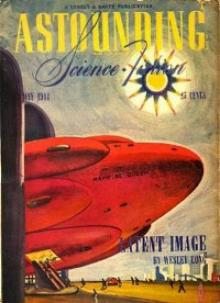 The Yehudi Principle
The Yehudi Principle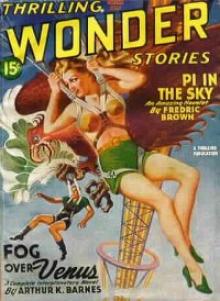 Pi in the Sky
Pi in the Sky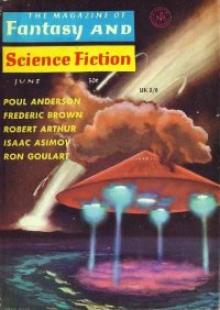 Eine Kleine Nachtmusik
Eine Kleine Nachtmusik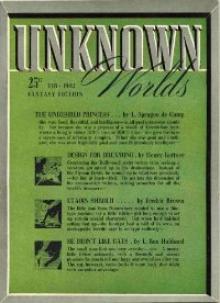 Etaoin Shrdlu
Etaoin Shrdlu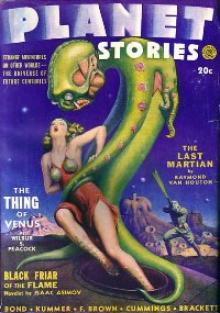 The Star Mouse
The Star Mouse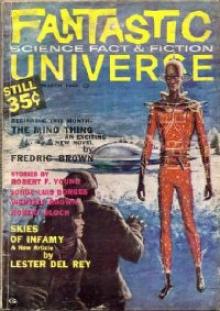 The Mind Thing
The Mind Thing The Screaming Mimi
The Screaming Mimi The Fabulous Clipjoint
The Fabulous Clipjoint Puppet Show
Puppet Show It Didn't Happen
It Didn't Happen Madball
Madball Happy Ending
Happy Ending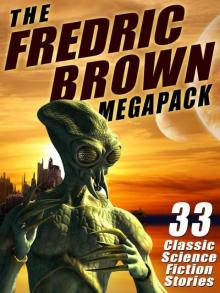 The Fredric Brown Megapack: 33 Classic Science Fiction Stories
The Fredric Brown Megapack: 33 Classic Science Fiction Stories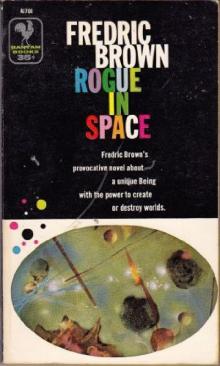 Rogue in Space
Rogue in Space Night of the Jabberwock
Night of the Jabberwock The Dead Ringer
The Dead Ringer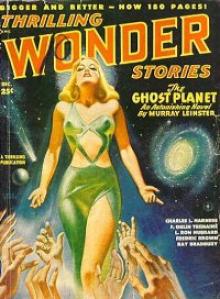 Knock
Knock We All Killed Grandma
We All Killed Grandma Space On My Hands
Space On My Hands The Collection
The Collection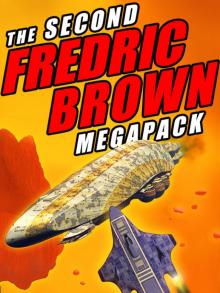 The Second Fredric Brown Megapack: 27 Classic Science Fiction Stories
The Second Fredric Brown Megapack: 27 Classic Science Fiction Stories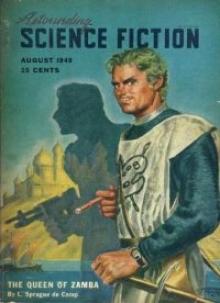 Letter to a Phoenix
Letter to a Phoenix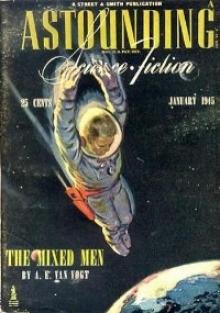 The Waveries
The Waveries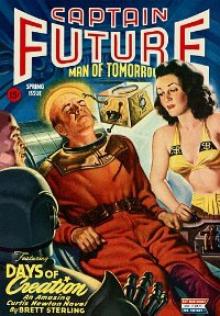 Nothing Sirius
Nothing Sirius The Deep End
The Deep End Nightmares & Geezenstacks
Nightmares & Geezenstacks Come and Go Mad
Come and Go Mad Martians, Go Home
Martians, Go Home